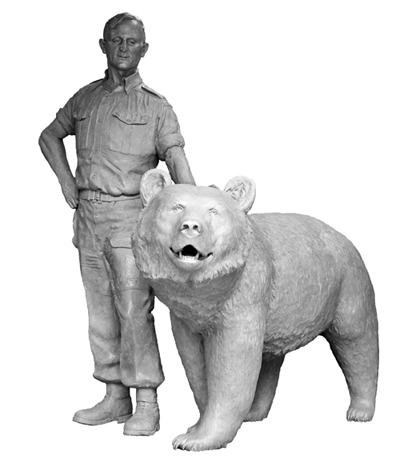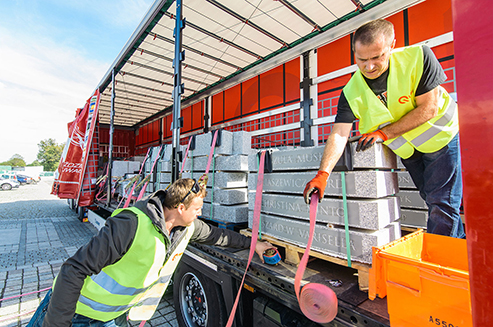The project of the “Monument of Polish Soldiers and Wojtek the Bear” was initiated by the Polish-Scottish Foundation Wojtek Memorial Trust that takes care of the memory about this extraordinary soldier of the 2nd Polish Corps, who became famous for his friendship with Polish troops and service as an ammunition-man (he carried artillery shells in his paws). The substructure of the statue will be made of granite provided by a mine in Strzegom and MCKB is covering all the transport costs of 12 tons of material. The delivery that will reach Edinburgh on September 8, will be realized by a shipping company from Gdansk – Rudniccy-Magetra.
“We received the offer to support the project and participate in organization of the transport from the Wojtek Memorial Trust” says Piotr Grabowicz, President of the Board of MCKB. “Aware of our history, we’re willing to join the effort of “building” the knowledge about our heroes, and surely Corporal Wojtek was one of them. The monument symbolizes brotherhood and trust in the difficult and savage times of war – feelings that helped people to survive and believe in a better tomorrow. Soldiers of Anders’s Army fought and died in a foreign land, thinking about their homeland. They were accompanied by Wojtek the bear who raised the morale of the troops and participated in the battles himself. By providing our granite for the substructure of the statue, we express our will to enable the artillery man and the extraordinary Corporal to stand on the Polish soil.”
The statue’s design was based on the memories of veterans and people who lived in the neighbourhood of Sunwick in Berwickshire where Wojtek stayed for a while after the war. While telling the story of the bear and the man, it will act as a reminder about the Poles’ role during the Second World War. Statues of the bear and soldier were designed so as to attract passers-by to establish a “dialogue” and evoke positive emotions. In the future, the monument will be the place of gathering for various educational, artistic and cultural events as well as those related to national heritage, Wojtek and Polish-Scottish relations.
The terrain for the monument was designed by Raymond Muszynski from Morris & Steedman Associates in Edinburgh. The engineering works are supervised by Sir Robert McAlpine and the project is by Wojtek Memorial Trust that is a foundation created by Aileen Orr (author of “Wojtek the Bear: Polish War Hero”), Krystyna Szumelukowa and General Euan Loudon.
“The idea of a memorial came from my husband, who also owned the terrains where, after the war, Wojtek’s unit was located, and the history of the extraordinary Corporal was told to me by my grandfather” says Aileen Orr. “I thought that definitely more people should learn about the soldier-bear since his service surely deserves a unique commemoration, not only in the form of a book. The offer of our foundation, Wojtek Memorial Trust, met with a very positive reaction from both the Polish and Scottish administration. They were most enthusiastic about the idea of the monument standing on the granite as on the Polish soil. That is when MCKB offered us to assist and covered the costs of transport of the material. We do hope that it’s a beginning of a fruitful co-operation related to the further projects realized in the memory of Corporal Wojtek.”
 The monument, 1.5 times larger than real-life Wojtek and the soldier, will be made of bronze in the art foundry of Powderhall Bronze Ltd, Edinburgh and according to the design of one of the finest British sculptors, Alan Beattie-Herriot. The statue will be placed in the heart of the historical centre of Edinburgh at the west end of Princes Street Gardens, with the backdrop of Edinburgh Castle, a place resembling Monte Cassino where Wojtek fought side by side with Polish troops. The construction works of the monument will be finished this year.
The monument, 1.5 times larger than real-life Wojtek and the soldier, will be made of bronze in the art foundry of Powderhall Bronze Ltd, Edinburgh and according to the design of one of the finest British sculptors, Alan Beattie-Herriot. The statue will be placed in the heart of the historical centre of Edinburgh at the west end of Princes Street Gardens, with the backdrop of Edinburgh Castle, a place resembling Monte Cassino where Wojtek fought side by side with Polish troops. The construction works of the monument will be finished this year.
“The story of Wojtek the Bear is one of the most interesting stories of the Second World War and one of the most positive accents of the horrible conflict”, says Konrad Czernielewski, a senior custodian in the Museum of Independence Tradition in Lodz, privately – an enthusiast of stories about animals who accompanied Polish troops on the front. “It is an example of a beautiful friendship, based mostly on similar experiences. Soldiers of Anders, who found Wojtek, fought for their homeland far from home that was taken from them by the invaders. The cub was an orphan whose mother was taken from him by an Iranian hunter. Humans and a “humanized” animal were connected by longing and a ‘homelessness’ of a kind – they found consolation in their common service which, full of difficulties typical of the war life, became lighter thanks to the mentioned friendship and positive emotions connected with it.”
The monument being erected in Edinburgh is not the first dedicated to this special soldier. The incredible story of Wojtek the Bear was reflected in statues in Imoli in the Northern Italy, in the English town of Grimsby, and also in Poland: in Cracow, Szymbark and Zagan. In the streets of Scottish cities one could see double-decker buses with a bear carrying an artillery shell and during this year’s Edinburgh Fringe Festival a play telling the stories about Wojtek’s war adventures was staged. In Edinburgh Zoo one may find a plaque commemorating his stay and a fascinating life.
The story of Wojtek the Bear
Our friendly hero was born in the Hamadan Mountains in the territory of today’s Iran (former Persia) in 1941. His mother was shot by a hunter. In 1942, on the road to Kandavar, an orphaned cub was bought from an Iranian boy by Polish soldiers from the 22nd Artillery Supply Company of the 2nd Polish Corps, commandeered by General Wladyslaw Anders. They called the bear “Wojtek” which means a “happy warrior”.
A cute cub soon won the hearts of soldiers and was enlisted in the company in the rank of a private. At first, Wojtek was fed with milk from a vodka bottle. He received his service papers and pay that covered a double meal along with beer which he received for good behaviour and drank with troops during breaks. As all bears, he liked honey as well as fruits, sweet syrups, marmalade and sweets which he skilfully unwrapped by himself. Also, he never refused to smoke a cigarette. He ate his meals with the troops and slept with them in a tent, cuddling them. He kept doing this despite having received his own “issued” sleeping-room made from a large wooden crate that had been used for supplies.
With his unit, Wojtek marched the war trail from Iran through Syria, Palestine, Egypt to Italy (he participated in the battle of Monte Cassino), and after demobilization he was sent to Great Britain and Scotland. He received the rank of a Corporal. When his company was going to Italy by ship, he was refused permission to board it – the officer granted it only when the Polish soldiers assured him that the bear “inspired the fighting spirit”. Wojtek was an invaluable brother in arms, supporting his colleagues from the unit in coping with the frontline life and horrors of war. He proved himself a great help as an ammunition-man – he willingly carried heavy crates with artillery shells, and never dropped any. It is no wonder then that “a bear carrying an artillery shell” became a symbol of the 22nd Company that could be seen on trucks, banners and uniforms of the unit’s troops.
Corporal Wojtek loved riding in a cab of a supply truck (as long as he could fit inside – as an adult bear, he weighted 500 lbs and was over 6 ft tall). Joyful, always willing to play, he truly enjoyed wrestling. When the fight was over, he licked the face of his defeated opponent. Despite being a big animal, he never used his strength against the weaker. One of his favourite tricks during a rest on a beach was swimming silently up to the bathing girls and coming out right among them. Initial panic ended with a rescue provided by Polish troops who used this method to establish contact with local girls.
When the war came to its end, Wojtek was in Italy with his unit. In 1946, they moved to Scotland and were located in Berwickshire. He became very popular, also with the media, and the Polish-Scottish Association accepted him as their honorary member. Troops of General Anders moved to various countries around the world, as they did not want to return to communist-governed Poland.
Wojtek remained in Edinburgh – in 1947. A Director of the local Zoo offered that they would take care of the brown-veteran. His popularity grew as he was visited by thousands of people, including the media. His colleagues from his former unit also visited and he jumped over the fence to – as in the old war times – wrestle in a friendly manner. The extraordinary soldier of Anders’s Army, already a veteran, died on 2nd December 1963.
A Lodz-based company MCKB is a general contractor of numerous key investments realized for regular clients such as ABB, SEGRO, SCA Hygiene Products, Amcor Rentsch Polska, ICI Polska, Reckitt, Benckiser, TKG, Takeda Pharma, Avon Cosmetics Polska, Procter & Gamble DS Polska, WILO Polska. Top projects include the refurbished historical Grohman Factory that serves presently as a head-office of the Lodz Special Economic Zone.
The company is active in the field of corporate social responsibility, acts to improve the standards in general contracting and safety at building sites, as well as propagates sustainable development and modern solutions for constructions (e.g. the BIM technology – building information modelling).
Source: MCKB
Photos © MCKB


